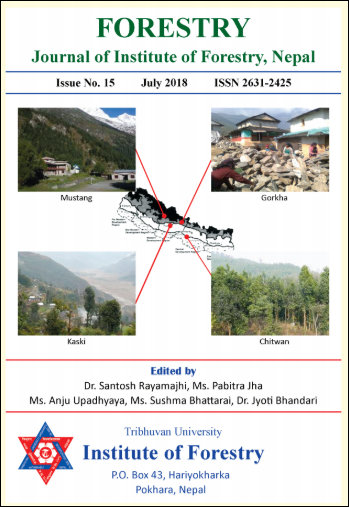Landslide Susceptibility Zonation Mapping in Post- Earthquake Scenario in Gorkha District
DOI:
https://doi.org/10.3126/forestry.v15i0.24920Keywords:
landslide hazard zonation map, landslide suseptibility index, digital elevation model, land use land cover, Gorka earthquakeAbstract
Landslide hazard zonation map is prepared to assist planners to implement mitigation measures so that further damage and loss can be minimized. In this study, post 25 April 2015 earthquake remote sensing data were used to prepare landslide inventory. Landsat images after the earthquake were downloaded from the National Aeronautics and Space Administration (NASA) website and processed using ArcGIS, ERDAS imagine and Analytical Hierarchy Process (AHP) as an extension in ArcGIS. The study was carried out in Gorkha district as this was the epicenter of the main earthquake of 25 April 2015 and consequently was highly affected by earthquake triggered landslide. The digital imagery was processed to analyze land use/land cover type. Geological features were analyzed using the criteria like color, tone, topography, stream drainage, etc. Primary topographic features like slope, aspect, elevation, etc. were generated from Digital Elevation Model (DEM). Seismological data (magnitude and epicenter) were obtained from Department of Seismology. For Landslide Susceptibility Zonation (LSZ) different thematic maps like Land Use and Land Cover (LULC) map, slope map, aspect map, lithological map, buffer map (distance from road and river/water source), soil map, and seismological map were assigned relative weights on the ordinal scale to obtain Landslide Susceptibility Index (LSI). Threshold values were selected according to breaks in LSI frequency and a LSZ map was prepared which shows very low, low, moderate, high, very high hazard zones in Gorkha district.
Downloads
Downloads
Published
How to Cite
Issue
Section
License
This license enables reusers to distribute, remix, adapt, and build upon the material in any medium or format, so long as attribution is given to the creator. The license allows for commercial use.




